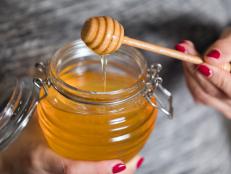What Is a Pre-Workout Supplement — and Do You Need One?
These supplements promise to improve performance, but they may not be right for everyone.

AleksandarNakic/Getty Images
Looking to fuel your exercise with a pre-workout boost? You've probably seen several pre-workout solutions in advertising — especially if you spend time in the fitness influencer world. Social media video snippets and so-called “expert” influencers are promoting a new pre-workout supplement every single day on all social media platforms Are these so-called energizing powders, supplements and drinks what you really need to maximize your workouts? Here's what a sports dietitian really thinks about pre-workout supplements.
What Is Pre-Workout?
There’s actually no formal definition for a pre-workout supplement, but the concept has developed over time to mean a product taken before exercise to give you a jolt of energy for improved performance. Pre-workout fueling with food is a long standing tactic to provide energy for workouts (more on that below), but the use of dietary supplements for this purpose has been steadily gaining popularity over the past few decades. (Yup, they’ve been around that long.)
Specific ingredients vary significantly among different products, but the majority of pre-workout supplements include a cocktail of stimulants like caffeine, plus ingredients for muscle performance including amino acids and creatine. Other common ingredients include artificial sweeteners and flavorings.
Risks of Taking Pre-Workout Supplements
The appeal of getting more energy for exercise is obvious but since these products provide very few calories, they fall short in the energy department. Stimulants provide the illusion of energy, giving your nervous system a neurological boost, but also can interact with medications and illicit side effects including increased anxiety, jitteriness and stomach upset. Pre-workouts taken later in the day or evening can also negatively impact sleep — another vital component to optimizing workouts.
Just like other dietary supplements, pre-workout supplements are poorly regulated by the FDA and are often improperly labeled and contaminated, so hidden dangers exist beyond what the ingredient list discloses. Savvy consumers can look for products that have been tested and verified by a third party such as NSF Certified for Sport. However, even products with this extra layer of assuranceare not guaranteed to be effective for every individual looking to improve their workout results.
Further, pre-workout supplements are often taken improperly. Depending on the ingredients they may be taken too close or too far away from exercise, which can impact their effectiveness. The popular trend of “dry-scooping,” which means taking a pre-workout powder without mixing in liquid, in no way improves the action of the supplement and may in fact, inhibit some of its effects. Downing a mouthful of powder certainly won’t help you stay hydrated, which is also vital to optimal performance.
A review published in 2018 found that while some individuals can benefit from using pre-workout supplements, the long term safety and efficacy is not well established.
Ingredients like caffeine and creatine are proven ergogenic aids in some subjects. That said, serious exercise enthusiasts would be remiss to skip a pre-workout meal for a pre-workout supplement.
What You Really Need to Fuel Your Workouts
Let’s get right to it – exercise needs fuel and fuel comes from food. As activity approaches, aim to consume easily-digestible carbohydrates for quick energy with a small amount of protein to provide your muscles with what they need. This can be achieved by reaching for a banana with a spoonful of peanut butter, a small container of yogurt or a bowl of oatmeal. And of course, don’t forget the fluids.
A TikTok trend that has been getting lots of attention has been a to-go tactic for many a sports dietitian to fuel athletes during activity: Eating a crispy rice treat before a workout is actually a splendid idea for some quick, easily digestible fuel – you can’t get much easier to digest than that mix of puffed rice and marshmallow. You can make your own or shop around. Pre-made bars such as Blake’s Seed Based, Annie’s, and Clif Bar Duo are good option as they are portable, shelf stable, allergen-friendly and available in several flavors.
Dietian-Recommended Pre-Workout Snacks
Bottom Line: Pre-workouts are not as glamorous as social media leads you to believe.
Most are lacking the calories needed to truly fuel exercise, plus a high dose of stimulants may do more harm than good. If you do choose to use a pre-workout, do your homework, check with your doctor especially if taking medications and consult a qualified sports dietitian to determine what may be the best fit for you.
Dana Angelo White, MS, RD, ATC, is a registered dietitian, certified athletic trainer and owner of Dana White Nutrition, Inc., which specializes in culinary and sports nutrition. She is the author of four cookbooks First Bites: Superfoods for Babies and Toddlers, The Healthy Air Fryer Cookbook, The Healthy Instant Pot Cookbook and Healthy Quick and Easy Smoothies.
*This article was written and/or reviewed by an independent registered dietitian nutritionist.
Related Links:




































